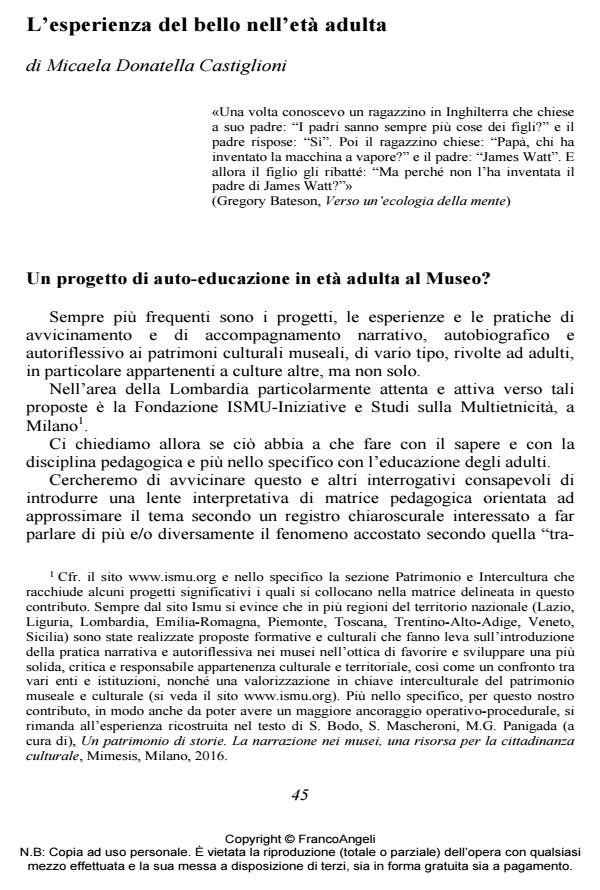L’esperienza del bello nell’età adulta
Titolo Rivista EDUCATIONAL REFLECTIVE PRACTICES
Autori/Curatori Micaela Donatella Castiglioni
Anno di pubblicazione 2016 Fascicolo 2016/1
Lingua Italiano Numero pagine 22 P. 45-66 Dimensione file 231 KB
DOI 10.3280/ERP2016-001005
Il DOI è il codice a barre della proprietà intellettuale: per saperne di più
clicca qui
Qui sotto puoi vedere in anteprima la prima pagina di questo articolo.
Se questo articolo ti interessa, lo puoi acquistare (e scaricare in formato pdf) seguendo le facili indicazioni per acquistare il download credit. Acquista Download Credits per scaricare questo Articolo in formato PDF

FrancoAngeli è membro della Publishers International Linking Association, Inc (PILA), associazione indipendente e non profit per facilitare (attraverso i servizi tecnologici implementati da CrossRef.org) l’accesso degli studiosi ai contenuti digitali nelle pubblicazioni professionali e scientifiche.
Is it possible to think of the experience of beauty, or aesthetic experience, as an experience within and through which we may process, construct, revisit and problematize meanings? The objective outcome of beauty would thus take on subjective value with which to confer meaning on, and make sense of, our lives. On these and other conceptual grounds, this paper asks whether educating to beauty in museum settings (with reference to one project in particular) can offer a valid form of adult education when delivered via a cultural, self-learning and self-educational dispositive based on a narrative-autobiographical approach, in which a museum mediator who has been duly trained in self-narrative and self-reflective practices plays a key part in facilitating the learning experience. More specifically, it is proposed that educating adults to beauty may lead them to experience growth, for example by increasing their capacity for wonder or helping them to critically decentre, etc., in the encounter between their own perspective and that of others, including the museum mediator. The actors in this journey-process, that is to say, museum mediators and their interlocutors, who include both Italian and international visitors, enjoy the opportunity to experience both self-care and care for others, where care is defined as a taking on of responsibility. Finally, the author examines the equivalence between educating to beauty-educating to narrative-educating to cultural, critical, active and responsible citizenship: the last-mentioned dimension represents an increasingly urgent priority within the education and training practices targeted at adults in the contemporary era, in which territorial barriers are giving rise to a deep and complex state of crisis that may also contribute to a loss of meaning at both the individual and collective levels. The approach discussed here is situated within a broader educational-pedagogical framework and agenda that is "interioristic" and "introspect¬tive" as well as closely related to the perspective of "narrative pedagogy".
Micaela Donatella Castiglioni, L’esperienza del bello nell’età adulta in "EDUCATIONAL REFLECTIVE PRACTICES" 1/2016, pp 45-66, DOI: 10.3280/ERP2016-001005